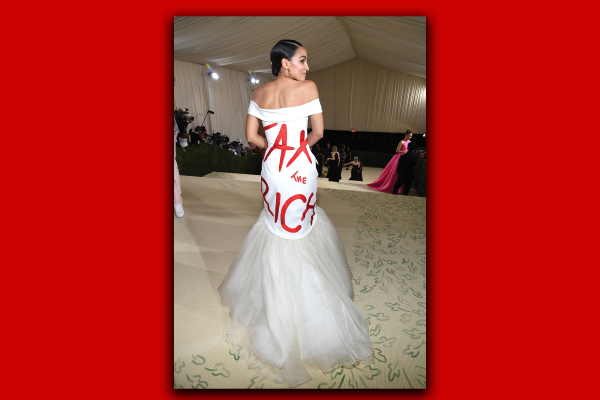THE MET GALA is fascinating. Part chaos and part fundraiser, the Gala has created a treasure trove of cultural touchstones and meme-worthy content over the past few years. Created in the 1940s to benefit the Metropolitan Museum of Art’s Costume Institute, the Gala is, at its core, a paean to the sartorial arts. In many ways, it’s the gift that keeps on giving, especially if you, like me, are not opposed to a lot of pomp and very little circumstance. However, in the thick of my 2 a.m. behind-the-scenes-at-the-Met video binge, a thought occurred to me that I’ve been turning over ever since: America may not have bread, but it sure has circuses.
Media theorist Neil Postman said as much—far more eloquently—in his prescient 1985 book Amusing Ourselves to Death. Decades after the book’s publication, I still find its message chilling. Postman’s thesis is that the technology and spectacles we love, rather than state oppression, will lead to our downfall. As a Black person in this country, I know both options are possible, but in terms of our media addiction, Postman’s got us pegged. I worry often about corporations buying our attention and the political implications of who we’re told to sympathize with or listen to. Algorithms and endless queues of “related videos” were not made to encourage human flourishing, but rather to benefit shameless tech companies and their investors.
Watching Vogue’s coverage of the Met Gala, I realized that I was being manipulated. Not in an overtly malicious way; more in the all too familiar, “Hey, these beautiful wealthy people are just like you!” way. It’s a fantasy that keeps everyone too dazzled to see the social dynamic for what it is—aristocracy in the 21st century. As a cloud of assistants glued gems on a pop star’s nails or sewed dress hems on hands and knees, unease crept in. As much as I love the fantastic dresses and the stylistic risk-taking, the Gala felt like a potent reminder that we do not all live in the same reality, and that very little of this glamour is truly meaningful.
I’m aware that YouTube videos (or Instagram posts) at 2 a.m. are not everyone’s vice. But, if it’s not celebrity drama, it might be the news cycle or email. Managing attention in a time like this can be incredibly difficult. It’s not just that we’re being primed by our phones to lap up the content it curates for us. It’s that life is getting more complicated and exhausting for most people. While a little escapism is necessary, the escape offered by our phones doesn’t ultimately offer a holistic or life-giving solution.
How do we cultivate practices of attention that mirror the values we hold dear in a world that is constantly trying to distract? I don’t know. But a few days ago, one of my plants surprised me with a new leaf, and the joy I felt was far greater than any aimless clicking on social media. Maybe, it can be that simple: Tuning in to what is real and in front of us. Sitting in the present. Sinking into what we really love, instead of what’s available. And, most important, avoiding YouTube after midnight.

Got something to say about what you're reading? We value your feedback!







